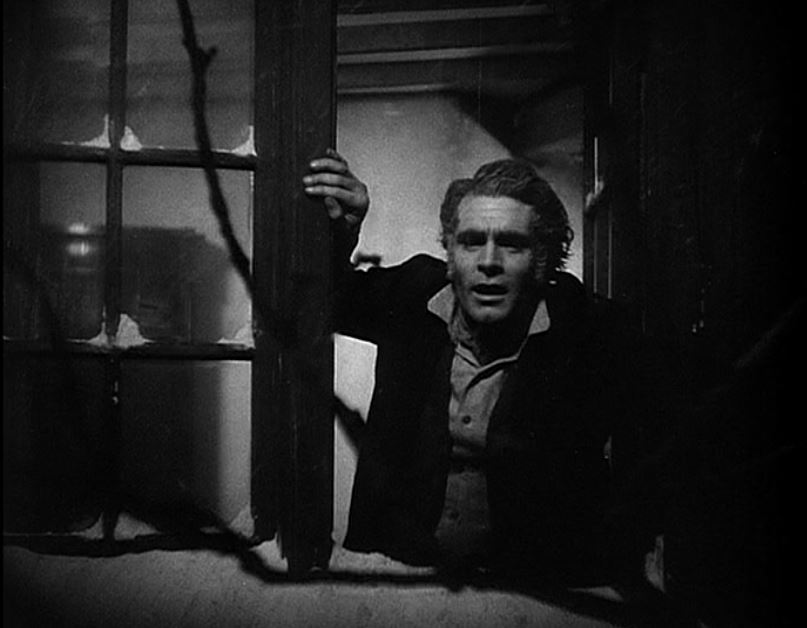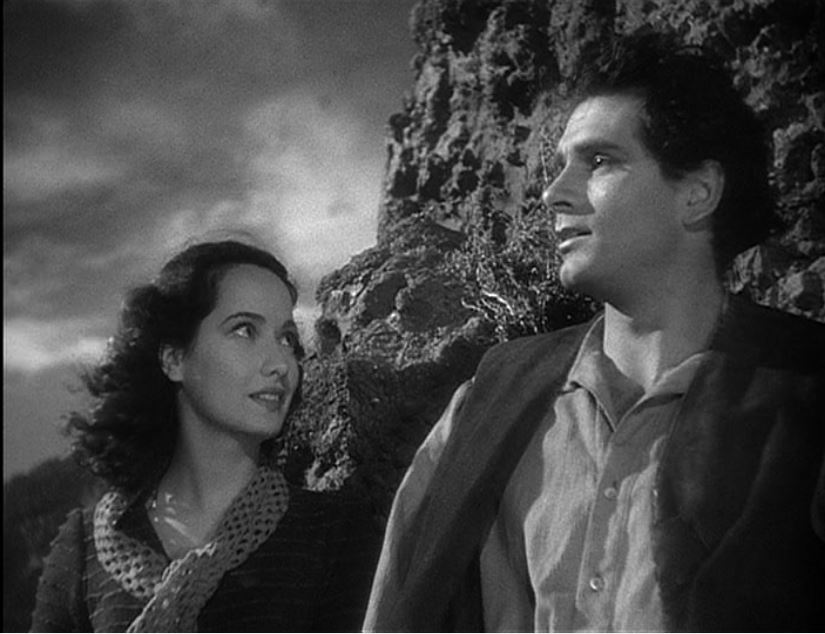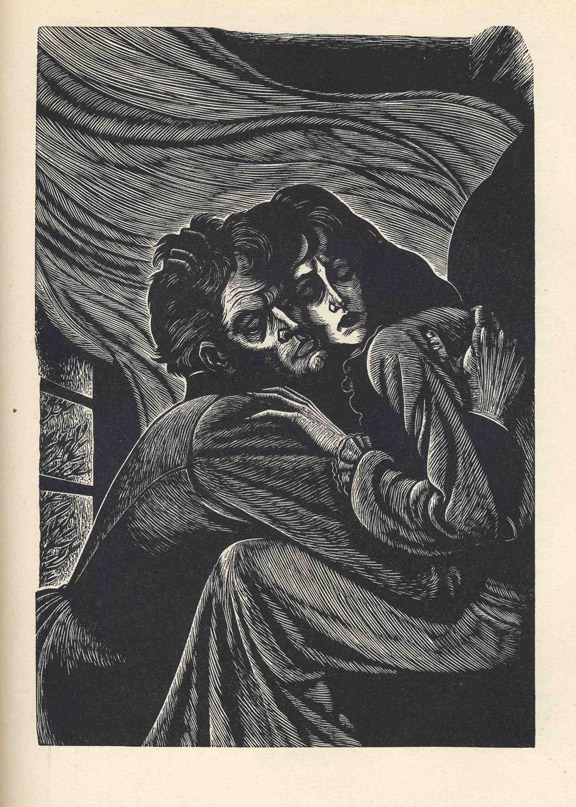
Blogging around Thanksgiving can be tough. Unlike Halloween or Christmas, there really aren’t that many Thanksgiving movies, certainly none considered seasonal classics like the Universal horror lineup or It’s A Wonderful Life. However, there are plenty of movies I’m thankful for: movies that introduced me to a beloved artist, movies that remind me of a family member or friends, movies that I associate with a fond memory.
So I decided to highlight one such movie today: William Wyler’s 1939 adaptation of Wuthering Heights. Why am I so thankful for this movie? Because it led me to what is now my favorite novel of all time, though not in the way you might expect… especially since I technically read Wuthering Heights before seeing the movie.
My introduction to Emily Bronte’s 1848 gothic masterpiece was typical of most readers: it was assigned reading during my senior year of high school. Now, today I am a great lover of what we call “classic lit.” Back then though? I hated pretty much everything for assigned reading in school, save for Shakespeare and Edgar Allan Poe. Having to read what I considered depressing, confusing stuff during my three months off didn’t make me relish the likes of The Great Gatsby, Of Mice and Men, or Wuthering Heights. Wuthering Heights especially drove me mad as it is a demanding work for an adult, let alone for a teenager.

Set in 18th century England, the story centers on Heathcliff, an orphan foundling adopted into the Earnshaw family, who belong to the landed gentry. When his doting adopted father takes ill and dies, Heathcliff is left at the mercy of the Earnshaw heir Hindley, who forces him to the level of a servant. Heathcliff’s lone solace is his relationship with his adopted sister Catherine, a fellow free spirit who enjoys mischief and long hours on the nearby moors. Hindley’s attempts to keep the friends apart only serve to strengthen their kinship– that is, until Catherine catches the eye of handsome Edgar Linton, the heir of the nearby Thrushcross Grange. As much as she loves Heathcliff, Catherine is seduced by Edgar’s fine breeding and wealth, and opts to marry him so she can be the finest lady in the county and then use her newfound influence to take Heathcliff out of her brother’s power. Feeling betrayed by his one friend and unaware of her hope to rescue him from servitude, Heathcliff runs away, much to Catherine’s horror.
A few years pass before Heathcliff returns, now the owner of a decent fortune. Overjoyed, Catherine longs to resume their friendship, but Edgar isn’t fond of Heathcliff and Heathcliff has a mind to have his revenge on everyone that wronged him. And his vengeance is so great that it threatens to consume not just Catherine, Edgar, and Hindley, but also the next generation and even Heathcliff himself.
Covering roughly three decades, the book is not written in a conventional way: there is a framing story set in 1800, but much of the novel is presented in flashback, told by the former Earnshaw servant Nelly Dean, who, by the way, is not always the most unbiased narrator. Characters often have similar names (Edgar and Catherine’s daughter is named Catherine; Heathcliff’s son by Isabella Linton is named Linton Heathcliff; Hindley has a son named Hareton), a device meant to emphasize a sense of cyclical repetition but one that only served to send me to Sparknotes constantly just to keep track of who was who.
And then there are the characters, who are almost uniformly unlikable. The books and movies I enjoyed featured main characters who were sympathetic and easy to root for, so I didn’t know what to make of Wuthering Heights, where victimized characters often become vicious victimizers and the central pair of lovers engage in obsessive, cruel behavior. Heathcliff is a particularly monstrous sort, treating others with sadistic relish once he comes into power and doesn’t have to take anyone’s crap anymore. Bronte initially makes it seem as though Heathcliff will be a diamond in the rough who can be transformed through love– and then she pulls the rug out under the reader, with his undying love for Catherine being the thing that only just barely makes Heathcliff seem vulnerable and human at all.
Honestly, I was too young to properly appreciate the uncompromising nature of the story or the psychological complexity of the cast. That, and I just wanted to spend hours on my PS2 and nowhere near some old book I’d have to write a report on before August. When I was done with the novel, I shoved the paperback in a drawer and never thought I’d ever touch it again.
Wuthering Heights entered my life again about a year later. Throughout senior year, I was in the early phase of my film geekdom and my way of sampling a variety of genres and eras was to go through the American Film Institute’s many curated lists. You know– the Top 100 American films, Top 100 Thrills, etc. Included on the Top 100 Passions list (a compilation of the best romantic American films) was William Wyler’s 1939 version of Wuthering Heights.

I don’t remember what my response was to seeing this title on the list. Probably an eyeroll. But I dutifully watched it… and wouldn’t you know, I was crying at the end and haunted by the film for weeks after seeing it. I literally stayed up all night thinking about it once. When that happened, I knew I had to reread the book.
And what do you know? I loved it and stayed up all night thinking of Bronte’s characters once again. I haven’t stopped thinking of them ever since.

Twelve years on and I still love Wyler’s Wuthering Heights. It’s a golden example of the exquisitely mounted melodramas the big Hollywood studios put out during the 1930s and 1940s. The black-and-white visuals perfectly evoke that desired gothic, haunted atmosphere in which ghosts chill the air and even the strongest love possesses undercurrents of yearning and pain. Director William Wyler creates a sharp contrast between the exteriors and interiors, mirroring the way Catherine is torn between her desire for the moors (where she and Heathcliff can be free of the class distinctions that keep them apart) and the seductive comforts of high society. But of course, the heart of the production is the chemistry between Laurence Olivier and Merle Oberon– passionate, obsessive, and borderline sadomasochistic in their onscreen interactions. Both actors do well bringing these charismatic but infuriating people to life. That they have any chemistry at all is impressive, given that the two performers were reportedly at each other’s throats on set.
I know as a fan of the novel I’m supposed to hate this movie. As an adaptation, Wyler’s movie is hardly faithful to Bronte’s original. The setting was changed arbitrarily to the 1840s rather than the late 18th century purely on the whim of the producer Sam Goldwyn. The screenwriters toned down the nastiness of the characters. The entire second half of the book was cut from the script, thwarting the book’s focus on how abuse can beget more abuse and how the second generation of characters decide they will not repeat their parents’ mistakes.
Without the second half, it is true that the story loses much of the source material’s uniqueness and power, becoming a far simpler romantic drama about the unfairness of the British class system. If I have one big complaint about the film today, it’s that the ending seems so abrupt without the later stages of Heathcliff’s revenge. However, that might only seem so problematic to me because I am now thoroughly familiar with the novel. Back then, I was satisfied with the ending and other viewers might argue this ending works well in the context of the movie. Indeed, on its own merits, the film remains a beautifully mounted gothic drama, among the best of its era. I always enjoy seeing it– I prefer to think of it as a study in Wuthering Heights, much as Olivier saw his 1948 Hamlet film as “a study in Hamlet” due to its truncated nature.

Today, I am a certified Wuthering Heights junkie. I’ve read the novel over ten times and own several editions of the book. I’ve seen most of the film and TV adaptations. I’ve even watched the enjoyably cheesy 1996 Cliff Richard musical.
But all of that love only blossomed because the Wyler film inspired me to give the book another chance. For that, I will be forever grateful.


My Dad and I were by ourselves one weekend and we ended up seeing this on TCM. We both felt utterly depressed afterwards thinking it was almost too tragic.
LikeLike
No one would ever confuse the movie for a feel-good picture, that’s for sure.
LikeLike
This film has long been one of my favorites, and I loved reading about your admiration for it! If someone is reticent to give Wyler’s interpretation a whirl, I will be directing them to this article 🙂
LikeLike
Thank you!!
LikeLiked by 1 person